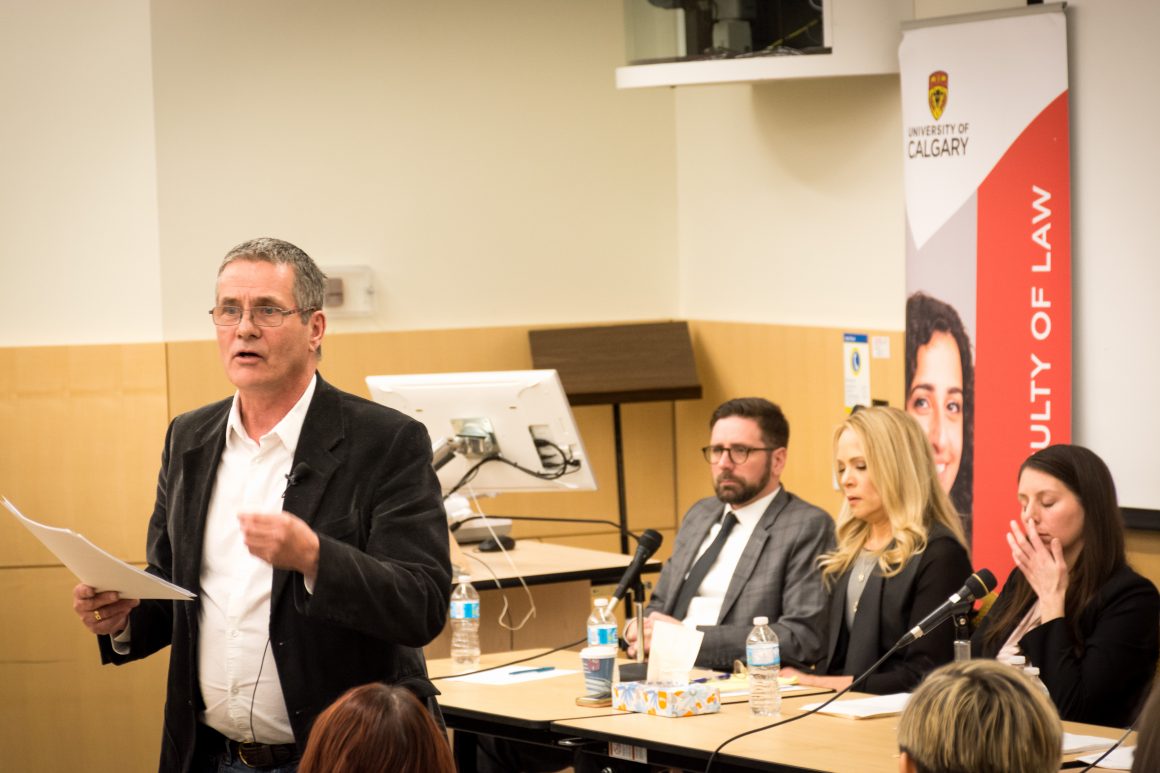
Wrongful convictions topic of U of C Faculty of Law forum
By Justin Schellenberg, February 26 2018 —
As part of the International Wrongful Conviction Day, the University of Calgary Faculty of Law held a forum on the issue on Feb. 13 with guest speaker David Milgaard talking about his 23 years of wrongful incarceration.
Milgaard was wrongfully convicted of the rape and murder of Gail Miller in 1969 and remained in jail until 1992. Since his release, Milgaard has advocated for Canadians facing similar situations.
“Our Canadian criminal justice system is a failure,” Milgaard said. “We have a lot more to do [going] forward to help free our innocent in our prisons. We must get them out of prison quickly.”
Milgaard is advocating for the Canadian justice system to implement an independent board of review to look at convictions early on, to avoid similar incidents from happening. He is also pushing for a better system for providing compensation for those who have been wrongfully accused.
“I hear many voices of the wrongfully convicted tell us how the Canadian government and the provincial governments literally starve them out to get them to settle for less,” Milgaard said. “It makes me sick to think how we possibly call this justice in our country.”
The event, titled “20 Years On: A Retrospective on Wrongful Conviction,” also hosted a panel of speakers including members of the Faculty of Law and CTV Calgary’s Jocelyn Laidlaw, who spoke about what role the media plays in wrongful convictions.
“Canadians are simply too busy living their own lives to take a day off of work to go sit in a gallery of a courtroom and watch a proceeding. That’s why we’re here,” Laidlaw said.
Laidlaw said media coverage can be a complicating factor in police investigations by shaping the narrative of the investigations and putting pressure on them to come up with information.
“Newsrooms have a proven track record of eagerly gobbling up these storylines that later turned out not to be true,” Laidlaw said. “[The police] do more often than not get it right, but when they don’t, journalist are along for the ride, to the detriment of the accused, their victims and their families.”
U of C Faculty of Law assistant professor Michael Nesbitt spoke to the audience about the need for more education on issues of wrongful incarceration and that the justice system should be willing to adjust it’s practices to help avoid circumstance like what happened to Milgaard.
“We have very few university courses on wrongful convictions and even fewer studies on law reform initiatives,” Nesbitt said. “Wrongful convictions can and should change criminal law and procedures. Sadly, that is not always or even often the case and innocent Canadians pay the price.”
Nesbitt said though the justice system is far from perfect, those involved in criminal cases can have a positive effect on the outcome by striving to be fair and balanced in their approach.
“Our compassion, our empathy, our search for fairness and specifically our underlying efforts to avoid and prevent miscarriages of justice must drive our quest in the criminal justice system,” Nesbitt said.
In closing his speech, Milgaard again stressed the need for an independent review board to help avoid similar incidents from happening to others.
“It’s time for all of you to wake up,” Milgaard said. “This really can happen to you, or even worse, and I hate to say it, your children. I beg all of you not to forget what has been said here this afternoon. We cannot let our wrongfully convicted be treated this way anymore.”
